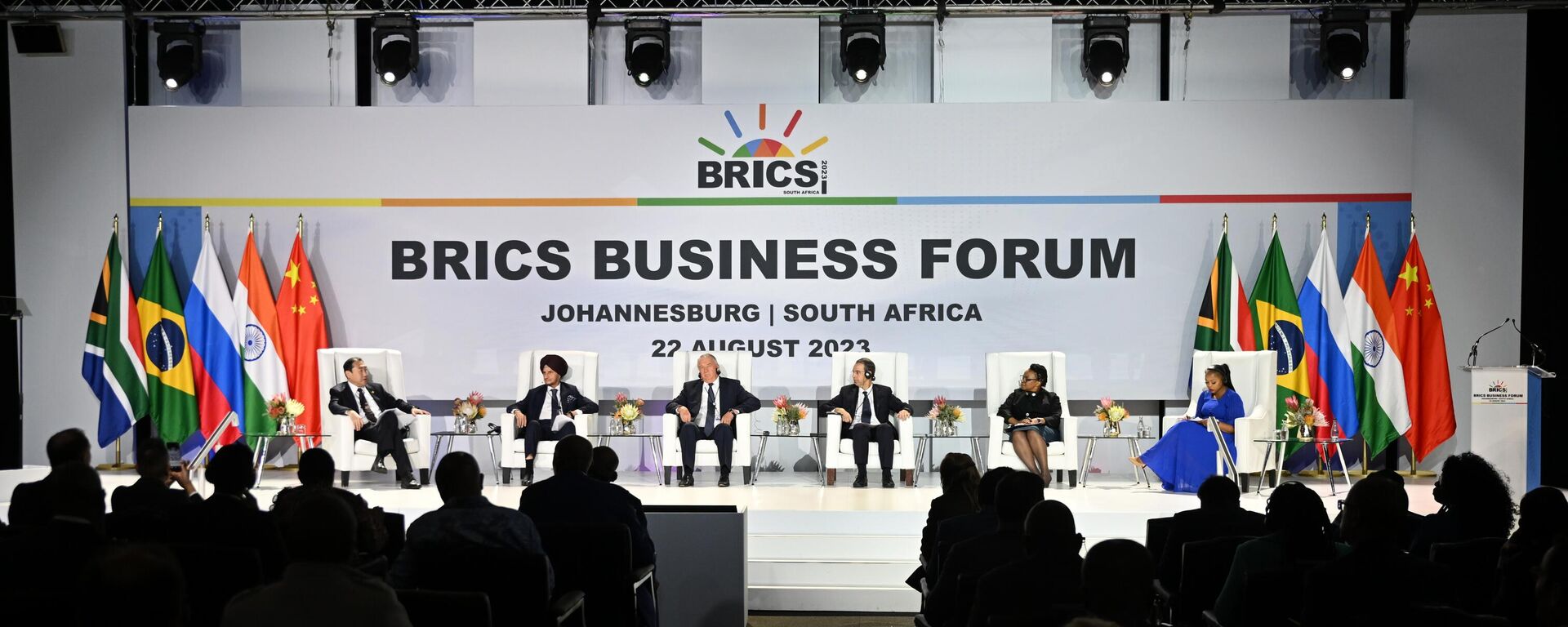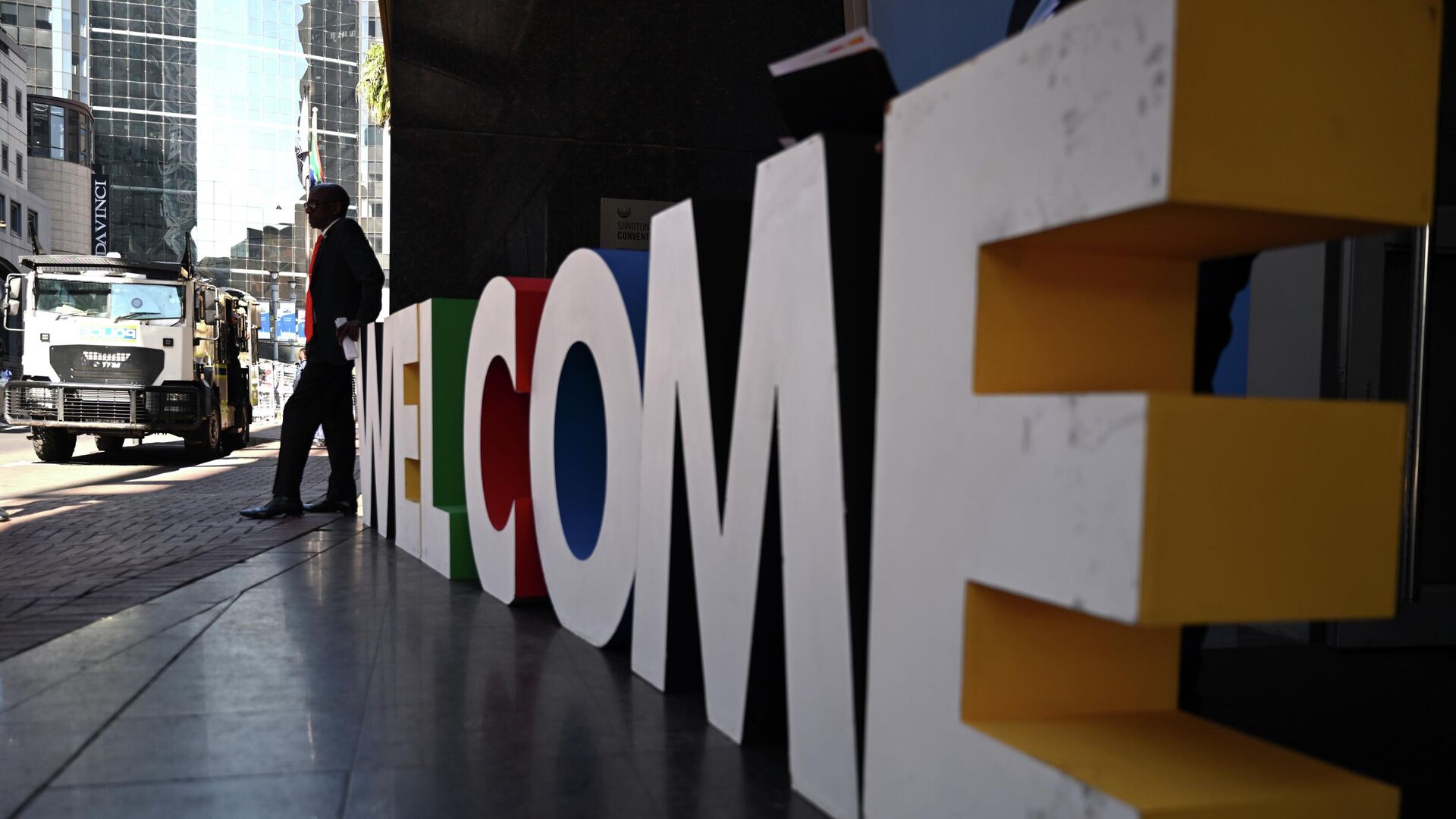https://sputnikglobe.com/20230826/expanded-brics-has-big-economic-prospects-despite-possible-political-disagreements-1112902355.html
Expanded BRICS Has Big Economic Prospects Despite Possible Political Disagreements
Expanded BRICS Has Big Economic Prospects Despite Possible Political Disagreements
Sputnik International
The enlargement of BRICS could have big prospects for the economic development of member states, despite potential disagreements among them as regards the group's political role in the international arena, experts told Sputnik.
2023-08-26T03:54+0000
2023-08-26T03:54+0000
2023-08-26T03:52+0000
analysis
china
russia
brics
g7
saudi arabia
reserve currency
dollar hegemony
ditching dollar
https://cdn1.img.sputnikglobe.com/img/07e7/08/16/1112780129_0:0:3072:1728_1920x0_80_0_0_e7267cf14ef5246b74f9f95f01797e22.jpg
Expansion represents a "dramatic" step forward for the bloc on its path toward multipolarity, which has already been catalyzed by the Ukraine conflict as it seriously polarized the G7 and the global South, Alan Cafruny, the Henry Bristol Professor of International Relations at the Hamilton College said. "China's growing economic and political role in the Middle East — most notably brokering the resumption of Iran-Saudi relations — will be greatly enhanced. Russia also enjoys close economic and political relations with Egypt and the UAE. The enlarged BRICS bloc will further erode American power in the Middle East."A similar opinion is held by Roderick Kiewiet, a political science professor at the California Institute of Technology, who argued that the accession of economically powerful countries like the UAE, Iran and Saudi Arabia could be a "big deal" for BRICS. "The UAE, Iran, and Saudi Arabia are all economically important countries because of their oil. So their addition to BRICS is potentially a big deal," Kiewiet stated. The expert noted however that current and potential members of BRICS differ from one another in terms of their political traditions, which could make it hard for them to speak with one voice and pursue common political goals. "The Western countries, either in the form of the G7, the OECD [Organization of Economic Co-operation and Development], or NATO, have a great deal in common. They are all committed to free democratic values and institutions and market-oriented economies with strong property rights. Most of the BRICS+ countries are autocratic in one form or another, but India, Argentina, and Brazil have certain democratic tendencies and traditions. So it is hard to see how they can act as an influential bloc with common goals and interests," Kiewiet argued. It is hard to say that the enlarged BRICS, while potentially being a "strong competitor" to the G7, will act in unison, Cafruny also admitted. Apart from the expansion of BRICS, creating of mechanisms to reduce dependence of mutual trade within the group on such reserve currencies as the US dollar or the euro was another major topic discussed prior and during the bloc's 15th top-level summit. "The desire to replace (or at least supplement) the US dollar and the euro as reserve currencies is understandable ... The problem is that creating a competing currency is hard. This would have been done a long time ago if it were not so difficult. BRICS+ is not going to be a ruble zone, and if I were in charge of any of these other countries the last country I would put in charge of my monetary policy is China," Kiewiet noted. Cafruny, on his part, argued that the enlarged BRICS will "certainly erode" the status of the dollar, though it will remain the international reserve currency "for the time being." However, the expert underscored that "BRICS cooperation will make it more difficult for Washington to enact unilateral and extraterritorial sanctions."
https://sputnikglobe.com/20230825/how-new-logistics-routes-will-ensure-brics-security-1112896788.html
https://sputnikglobe.com/20230825/pepe-escobar-brics-11---strategic-tour-de-force-1112882830.html
china
russia
saudi arabia
Sputnik International
feedback@sputniknews.com
+74956456601
MIA „Rossiya Segodnya“
2023
Sputnik International
feedback@sputniknews.com
+74956456601
MIA „Rossiya Segodnya“
News
en_EN
Sputnik International
feedback@sputniknews.com
+74956456601
MIA „Rossiya Segodnya“
Sputnik International
feedback@sputniknews.com
+74956456601
MIA „Rossiya Segodnya“
brics, economic development of brics members, brics political role in international arena
brics, economic development of brics members, brics political role in international arena
Expanded BRICS Has Big Economic Prospects Despite Possible Political Disagreements
MOSCOW (Sputnik) - The enlargement of BRICS could have big prospects for the economic development of member states, despite potential disagreements among them as regards the group's political role in the international arena, experts told Sputnik.
Expansion represents a "dramatic" step forward for the bloc on its path toward multipolarity, which has already been catalyzed by the Ukraine conflict as it seriously polarized the G7 and the global South, Alan Cafruny, the Henry Bristol Professor of International Relations at the Hamilton College said.
"It clearly represents a victory for Russia and perhaps even more so for China. All of the Middle Eastern countries enjoy extensive trade and investment relations with both countries," Cafruny explained.
"China's growing economic and political role in the Middle East — most notably brokering the resumption of Iran-Saudi relations — will be greatly enhanced. Russia also enjoys close economic and political relations with Egypt and the UAE. The enlarged BRICS bloc will further erode American power in the Middle East."
A similar opinion is held by Roderick Kiewiet, a political science professor at the California Institute of Technology, who argued that the accession of economically powerful countries like the UAE, Iran and Saudi Arabia could be a "big deal" for BRICS.
"The UAE, Iran, and Saudi Arabia are all economically important countries because of their oil. So their addition to BRICS is potentially a big deal," Kiewiet stated.

25 August 2023, 18:56 GMT
The expert noted however that current and potential members of BRICS differ from one another in terms of their political traditions, which could make it hard for them to speak with one voice and pursue common political goals.
"The Western countries, either in the form of the G7, the OECD [Organization of Economic Co-operation and Development], or NATO, have a great deal in common. They are all committed to free democratic values and institutions and market-oriented economies with strong property rights. Most of the BRICS+ countries are autocratic in one form or another, but India, Argentina, and Brazil have certain democratic tendencies and traditions. So it is hard to see how they can act as an influential bloc with common goals and interests," Kiewiet argued.
It is hard to say that the enlarged BRICS, while potentially being a "strong competitor" to the G7, will act in unison, Cafruny also admitted.
"China and Russia view the BRICS as a vehicle for geopolitical and geoeconomic challenge to US/G-7 primacy. South Africa and Brazil explicitly disavow this intention, seeing it as a means of bringing about a more inclusive global economy," the Hamilton College professor said, adding, however, that the events at the Johannesburg summit still constitute a "turning point."
Apart from the expansion of BRICS, creating of mechanisms to reduce dependence of mutual trade within the group on such reserve currencies as the US dollar or the euro was another major topic discussed prior and during the bloc's 15th top-level summit.
"The desire to replace (or at least supplement) the US dollar and the euro as reserve currencies is understandable ... The problem is that creating a competing currency is hard. This would have been done a long time ago if it were not so difficult. BRICS+ is not going to be a ruble zone, and if I were in charge of any of these other countries the last country I would put in charge of my monetary policy is China," Kiewiet noted.

25 August 2023, 12:37 GMT
Cafruny, on his part, argued that the enlarged BRICS will "certainly erode" the status of the dollar, though it will remain the international reserve currency "for the time being." However, the expert underscored that "BRICS cooperation will make it more difficult for Washington to enact unilateral and extraterritorial sanctions."
BRICS — the group uniting the world's largest developing economies, namely Brazil, Russia, India, China and South Africa — held its annual top-level summit in Johannesburg from Tuesday to Thursday. On Thursday, Argentina, Egypt, Ethiopia, Iran, Saudi Arabia and the United Arab Emirates were officially invited to join the group.




